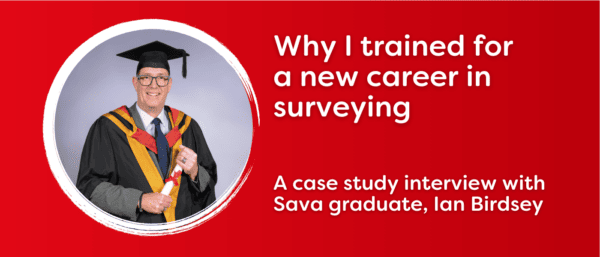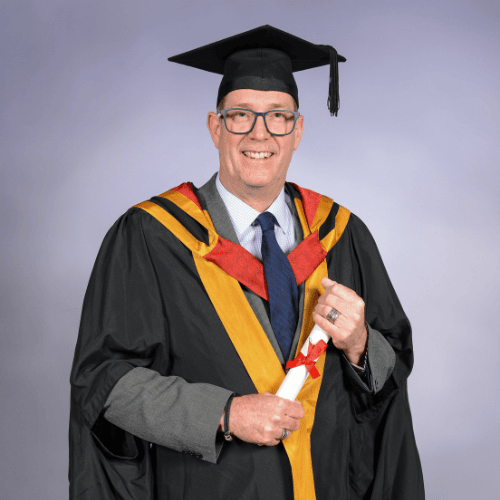Why I Trained for a New Career in Surveying.

We caught up with Sava residential surveying graduate, Ian Birdsey, to discuss his inspiration for pursuing a career in surveying, to find out more about his journey through the Diploma in Residential Surveying and Valuation, and to discover how his property surveying career has progressed since qualifying in 2020.
Ian is a qualified residential surveyor, valuer and director of IJKJ Services Ltd.
Read the interview below or download it here to read offline.
A bit about Ian
What was your background before training for a career in surveying?
I’ve had a fruitful career in IT and Communications. In the late 90s I was Network Engineer at Heathrow Airport at what was a time of change with the internet developing quite rapidly. Heathrow Airport, thankfully, paid for my BSc, which I completed on a part time basis over 5 years. Prior to this I had a role at the airport managing and testing a new airfield lighting computer system. I was then headhunted by a company called 3Com which, at the time, was one of the largest manufacturers of computer network products.
A couple of years later, I decided to go solo and set up an IT support service for schools and moved down to Devon where I spent 12 years renovating a 7-bedroom Edwardian Villa.
What made you consider surveying as your next career move?
After getting divorced, I moved to Towcester with my, now, wife, essentially leaving my IT business and customers behind in Devon, so I needed something else to do and wanted a change. I had been an events photographer and saw an advert on Facebook for a job taking property photos. This piqued my interest in pursuing a property career. Initially I trained as a Domestic Energy Assessor to produce EPCs, which I enjoyed. I then discovered Sava at an energy efficiency conference where they said, “You’d make a good surveyor” and I thought ‘yes, I could do that.’ I enjoyed visiting properties and already had experience taking property photos and assessing properties for the EPCs – so becoming a residential surveyor combined the two and felt like the logical next step in my career.
What was it about the Sava diploma that made you decide it was the training route for you?
To become a surveyor the options are essentially go to university or complete the Sava diploma. Degrees are great but quite focused on theory; with surveying you need practical experience to do the job properly.
I’m also too old to drop everything for university and then apply for graduate schemes. I needed a route where I could start working from day one after qualifying, and vocational training was the practical way for me to do it. It made life a lot easier for me as well as many others doing the course!
Sava’s training route covers theory and practice and concentrates on a focused area of surveying – the residential side. With a degree, you often start out with a broader knowledge of surveying, but then have to do a lot of further study to specialise in the area you wish to work. I already knew I wanted to be a residential surveyor, so the Sava route was a better fit for me.
About Ian’s learning experience
How did you find the learning experience with Sava?
The training was really good. My assessor was so thorough which helped me get the most out of the course. He persevered with me and got me through it – I can’t thank him enough for that.
Knowing that I wanted to work independently from the start, I purposely chose to inspect difficult properties for my assessment portfolio, such as listed buildings, because I knew it would push me to learn more and better prepare me for going it alone.
What was the highlight of the course for you?
I enjoyed studying building pathology – it aligned with some of my past experience and I found it so interesting. The hardest part was grasping the property valuation side of things; you just have to wait for it to click. Now I’ve got my head around it, it’s easy.
You started your training in 2018 and finished during Covid. What kind of challenges did you have to overcome in the months that followed?
It might seem strange, but it all worked out for me. I qualified just as we went into the first Covid lockdown, which gave me time to create my website, come up with a company name and develop branding, all without the pressure of trying to find work. I had everything up and running and my Associate RICS membership sorted by the time lockdown one had ended. The phone immediately started ringing and it hasn’t stopped since.
How well did the course prepare you for working life as a surveyor?
From the moment I enrolled on the Sava diploma, I knew I wanted to work independently. I’d spent years working for myself and wasn’t looking to give up all the perks of self-employment. The theory mixed with the practical property visits prepared me 100% to practice as an independent surveyor.
I emerged from the course being able to confidently undertake level 2 surveys and, as I’ve gained more experience, have now progressed to offering level 3 surveys, also known as building surveys. The right mindset is to always do a full and thorough inspection of the property, regardless of the level of survey.
About Ian’s surveying career
What have you been up to since qualifying for a career in surveying?
I went independent from day one and have built a great rapport with local estate agents who now recommend me to their clients. I probably get around 90% of my work from referrals and recommendations. I enjoy every day.
The next big step in my surveying career is pursuing chartership with the Royal Institution of Chartered Surveyors. I’m already an Associate member but have recently completed my Masters in Building Surveying to help me achieve Member status.

Despite being taken seriously ill during my studies, I persevered and graduated in December 2023 and hope to become Chartered very soon.
Being independent has also opened other doors for me. As I can choose my own hours, I’m also involved in the local Police Street Watch in my area as well as supporting refresher training for the Police Support Unit (the old riot squads). You get hit by the odd missile during training exercises, but it makes a change to climbing into lofts and sitting at home writing reports.
What has been the proudest – or most exciting – moment of your surveying career so far?
It’s always a proud moment when a client comes back and says ‘thank you very much’. I get some great Google and Trustpilot reviews which help me to realise how important and valuable my role is within the property industry.
What services do you now offer to your clients?
I provide level 2 and level 3 surveys, residential valuations and even project management services for property refurbishments. I’m looking to add a couple more strings to my bow in the near future including launching a new ‘find me a surveyor’ service online.
What advice would you give to the next generation of Sava learners seeking a career in surveying?
Enjoy your training experience! You’ll learn so much throughout the process. I’d also add not to be frightened by the law element of the course – you’ll hear phrases like ‘negligence claims’, but this part of the course is there to ensure you’re protected, not to scare you off. If you do your job properly, you won’t find yourself in a position to have to deal with any legal issues with a client.
On-site inspections are my favourite part of the role. It’s an enjoyable experience discovering all the issues and defects, especially when visiting older properties where there’s years of history to consider. As a surveyor, you get the fun of piecing it all together like a jigsaw to work out what’s wrong, how it happened and how things can be resolved. My advice is to lean into it and enjoy putting your detective skills to work.
Would you recommend the Sava diploma to others?
I’ve already recommended a career in surveying to lots of people including clients. It’s a significant financial investment, but it’s worth it. I have no hesitation in recommending it to anyone.
Do you feel the Sava diploma has provided value for money? If so, how?
Absolutely. It seems like a lot of money at first, but I’d earned my course fees back and some in four to five months. Return on investment was very quick for me.
In addition, the course provides something that university can’t, which is Associate RICS membership upon qualifying. You get your professional accreditation straightaway and can start practising as soon as you complete the diploma. You can’t really put a value on that!
In a few words, could you please sum up the impact the Sava diploma has had on your life?
It’s completely changed my life for the better. My standard of living has vastly improved. I have the expertise and confidence to go out and offer a service that people want and that makes a difference, which is a great feeling.
If you’re considering a career in surveying, hit the link to find out more about Sava’s part-time, vocational residential surveying course.